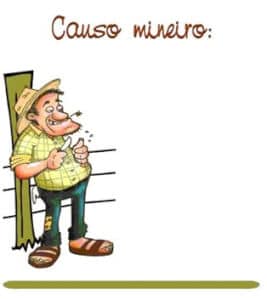Portuguese activity, suitable for students in the seventh or eighth year of elementary school, with exercises on Linguistic Variation.
This Portuguese language activity is available for download in an editable Word template, ready to print in PDF and also the completed activity.
Download this activity from:
SCHOOL: DATE:
PROF: CLASS:
NAME:
Paste, er
Quascai dendapia! I became aware of doncovim, noncotô, proncovô. Opceve kilocura!
Thank God nobody semaxukô!
NATURE AND CULTURE (Source: ARANHA, M.L. & MARTINS, M.H. Culture. In: Philosophizing: Introduction to Philosophy. SP: Modern, 1993, p.2-8)
1) Look at the image and read the text, then identify the speaker of the text. Which region of Brazil does he belong to?
A:
2) The text is written:
a) ( ) in formal language
b) ( ) informally
3) Translate the following excerpt and make the necessary corrections.
“I didn't know doncovim, noncotô, proncovô” .
Answer why the character was like this?
A:
4) Does the character's speech come from a matuto and, despite the errors, is it possible to say that he is making a very serious mistake by speaking in this way? Should he speak correctly? Explain with convincing arguments.
A:
5) Make the necessary corrections to the text.
A:
6) write LF to (formal language) and LI (for informal language:
Analyze which language we should use in the situations below:
a) ( ) When talking to a friend.
b) ( ) When talking to the school principal.
c) ( ) When writing a letter to an authority.
d) ( ) When writing a letter to the boyfriend (a).
e) ( ) When talking to a teacher.
f) ( ) When talking to my brother.
g) ( ) When talking to several friends.
h) ( ) When writing a text for the entrance exam.
i) ( ) When talking on the phone with a judge.
j) ( ) When talking to a matuto.
By Rosiane Fernandes Silva
At answers are in the link above the header.
